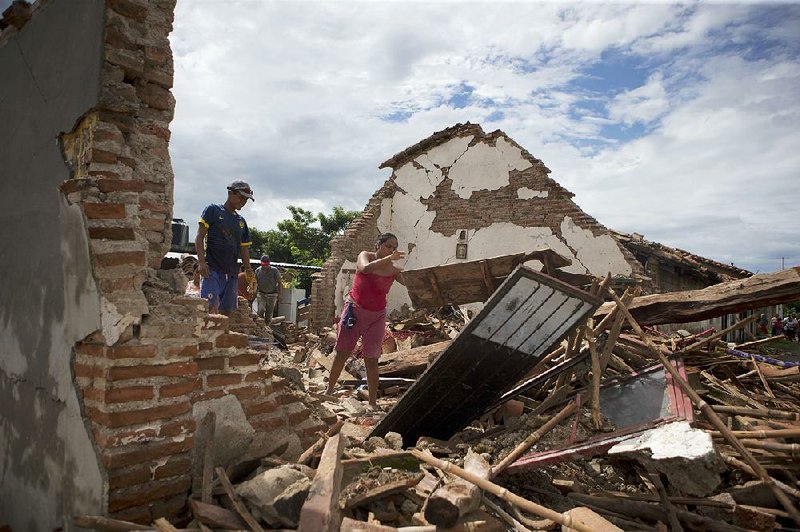JUCHITAN, Mexico -- Government cargo planes flew in supplies and troops began distributing boxes of food to jittery survivors of an earthquake that destroyed a large part of Juchitan and killed at least 37 people, even as officials on Sunday raised the nationwide death toll to 90.
Some people continued to sleep outside, fearful of more collapses, as strong aftershocks continued to rattle the town, including a magnitude 5.2 jolt early Sunday. Some prompted rescue workers to pause in their labor.
Local officials said they had counted nearly 800 aftershocks of all sizes since late Thursday's big quake, and the U.S. Geological Survey counted nearly 60 with a magnitude of 4.5 or greater.
Teams of soldiers and federal police armed with shovels and sledgehammers fanned out across neighborhoods to help demolish damaged buildings in Juchitan, where dump trucks choked some narrow streets as they began hauling away tons of rubble.
President Enrique Pena Nieto said a third of the city's homes were uninhabitable -- a problem that extended throughout the region. Both Chiapas and Oaxaca states reported thousands of homes, and hundreds of schools, badly damaged by the magnitude 8.1 quake.
Mexico's education secretary announced that schools will remain closed today in Oaxaca and Chiapas.
Aurelio Nuno said on Twitter that he visited several educational facilities in Chiapas that had experienced "various levels of damage," and he posted photos including one of a classroom whose exterior brick wall was cracked and buckled.
"Our house is now this almond tree," said Eneida Jimenez, a 55-year-old retired elementary school teacher and single mother of two whose home across the street was still standing, barely, its walls riven with massive cracks and its rooms littered with debris.
Jimenez, her mother, her children, her grandchildren, and clusters of other neighbors and relatives pass their hours under the tree, waiting for government workers to catalogue the damage and maybe offer some assistance to rebuild.
Like many residents, Jimenez does not have insurance for her home -- "We don't have this custom here," she said -- and they will be relying on government aid or whatever remittances may be sent by relatives in the United States.
"For 30 years, this was my sacrifice, my savings, the nights I ate, when I didn't eat, to give this house to my children," she said as she surveyed her broken home. "And I've lost everything."
Oaxaca Gov. Alejandro Murat said Sunday that the death toll in his state had risen to 71, while officials have reported 19 killed in neighboring states.
The earthquake caused so many deaths in Juchitan that slow-moving funeral processions caused temporary gridlock at intersections as they converged on the city's cemeteries.
On the outskirts of the city, the general hospital settled into its temporary home -- a school gymnasium with gurneys parked atop the basketball court. The earthquake rendered the hospital itself uninhabitable, so the gym contained a mix of patients that pre-dated the quake and those who suffered injuries as a result of it.
Maria Teresa Sales Alvarez said it was "chaos" when the earthquake struck the single-story hospital, but staff moved patients outside and transferred most of those who required specialized care to other facilities.
At the local fairgrounds in Juchitan, about two dozen residents of a central neighborhood gathered at the gates to what the military was using as a staging ground.
They came to complain that aid packages that the military started distributing Saturday had not arrived to many families. An army captain pleaded for patience, but ultimately agreed to take two pickups full of packages and water to their neighborhood.
It wasn't enough to satisfy all the residents who mobbed the trucks, but the captain promised soldiers would continue canvassing the city street by street.
"We're just going to wait for some kind of support," said Carlos Alberto Chinas Nolasco, a 21-year-old stylist sleeping under a slab of tin in his yard with the remnants of his destroyed house all around him.
Chinas was asleep Thursday night along with his father, a retired soldier, his mother, who runs a beer store, and his uncle, when the earthquake struck. They fled outside and watched as their home fell to the ground.
"These are ruins, and we're left with nothing. Without any work. What are we going to do?" he said.
Information for this article was contributed by Christopher Sherman, Peter Orsi and Mark Stevenson of The Associated Press; and Joshua Partlow of The Washington Post.
A Section on 09/11/2017

